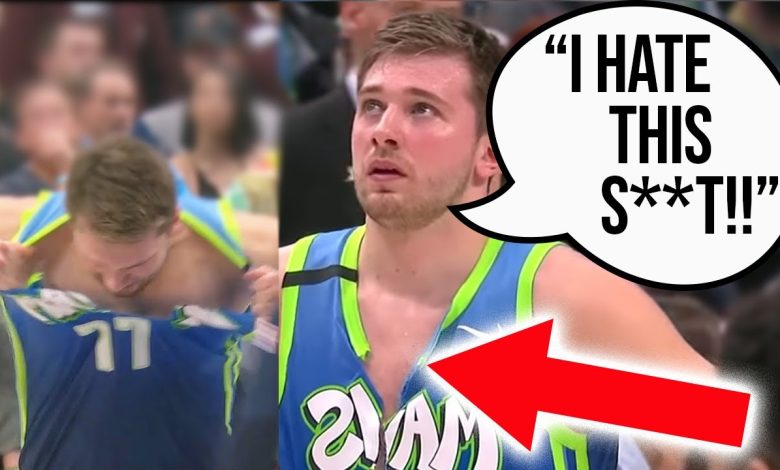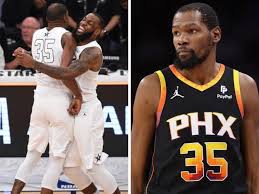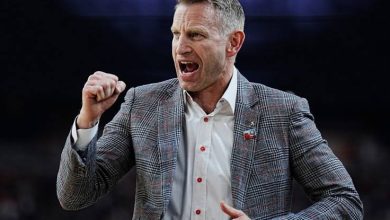Luka Dončić furious responds to critics calling him a failure,

BOSTON — Luka Dončić said his final words about this Dallas Mavericks season, now concluded, before the Boston Celtics had even lifted their championship trophy to the sky.
Dončić trudged to the interview room five minutes after the final buzzer of Game 5 of the NBA Finals, a 106-88 defeat on Monday that, at last, sent him into the offseason. It was a familiar sight: blood showing from his knee, exhaustion evident from his gait, brevity preferred within every answer he gave. Celebratory yells from his opponent sometimes sneaked in from the hallways. He ignored them. They weren’t for him.
“Nothing,” he said, asked to put what he was feeling into words. “Sad we lost.”
It was the longest year of Dončić’s career, one that held the highest and lowest moments of his career to date. He had, for the first time, reached the finals. He achieved far more than that: a scoring title, a 73-point game, his first top-three finish for Most Valuable Player. He became a father, a leader, a brother to his superstar teammate. He also became a lightning rod for those who saw his flaws, visible on the highest stage that was now being constructed to prop up another team.
“I’m proud of every guy that stepped on the floor, all the coaches, all the people behind,” Dončić said. “We didn’t win (the) finals, but we did have a hell of a season.”
Now, Dončić has choices to make. The nearest one concerns his next few months: Whether he joins the Slovenian national team to try to qualify for the 2024 Olympics.
“I have some decisions to make,” Dončić said. “I’m just trying to get a little bit healthier.”
Dončić plodded through the season’s final months with a slew of injuries and aches, most notably a right knee sprain he suffered in the postseason’s opening round. It was evident throughout this final series, one where he was statistically good, but often visibly not himself.
“It doesn’t matter if I was hurt, how much I was hurt,” he said. “I was out there trying to play. But I didn’t do enough.”
But there are decisions that loom even larger, ones that are less binary than opting in or out of a national team he has always shown up for. Dončić is a 25-year-old superstar whose trajectory has him on course for this sports’ highest echelon. He could change nothing and still finish within it, but how high he reaches might depend on how he changes his approach.
There was a chance for Dallas to make this series more competitive in the wake of Kristaps Porziņģis’ injury that sidelined him for Games 3 and 4. In that third game, with his team already down 2-0, Dončić’s emotional crash-and-burn led to him fouling out with more than four minutes remaining in the fourth quarter. It led to stricter scrutiny of his blemishes than ever before due to the significance of the moment.
It was the consequences of bad habits that have plagued him for years and bleed into each other. Dončić has often struggled with the physical conditioning needed to play six straight months of basketball; this year, it was closer to eight.

His magnetic presence on the court, fueled by emotion, falters when he knows he isn’t able to be himself. It manifests in outbursts directed at referees and even teammates. In this postseason run, it was amplified by his injuries. But in Game 5, it was clear from the opening moments that he had exhausted everything he had left in his 92nd game of the season.
Which is a lesson that matters, because this is a place where Dončić must return. It’s what those in his orbit expect of him.
“He’s one of the best players in the world,” Mavericks coach Jason Kidd said. “There’s going to be bumps and bruises along the way. For him, at the age of 25 to get to the finals, to be playing his basketball at the level that he’s playing is, now it’s just being consistent. … Because when you have one of the best players in the world, you should be always fighting for a championship.”
Dončić knows that failure is a chance to learn. In Game 4, two nights after the disappointing outing that effectively ended his first chance at this league’s championship trophy, he responded with his typical brilliance. He channeled his emotions through the basketball, not those around it, and led Dallas to victory. This is a familiar cycle, which he performed earlier this postseason and even during the dogged regular season days of this very season that feel so distant. It’s a habitual one he wants to break, has tried to break. Doing so may take hard lessons on this final stage to drive home what else must be done.
“It starts in the summertime, it starts early in preseason when you’re developing your habits,” said Kyrie Irving, asked what it actually looks like to grow from failure. “I think if you look at the overall big picture, Luka’s right, and I’ve been saying it too, just failure, it can inspire you beyond measure.”
Whether that happens for Dončić begins now. Not because there’s any remaining questions about his basketball brilliance, but about how much greater it can be.




